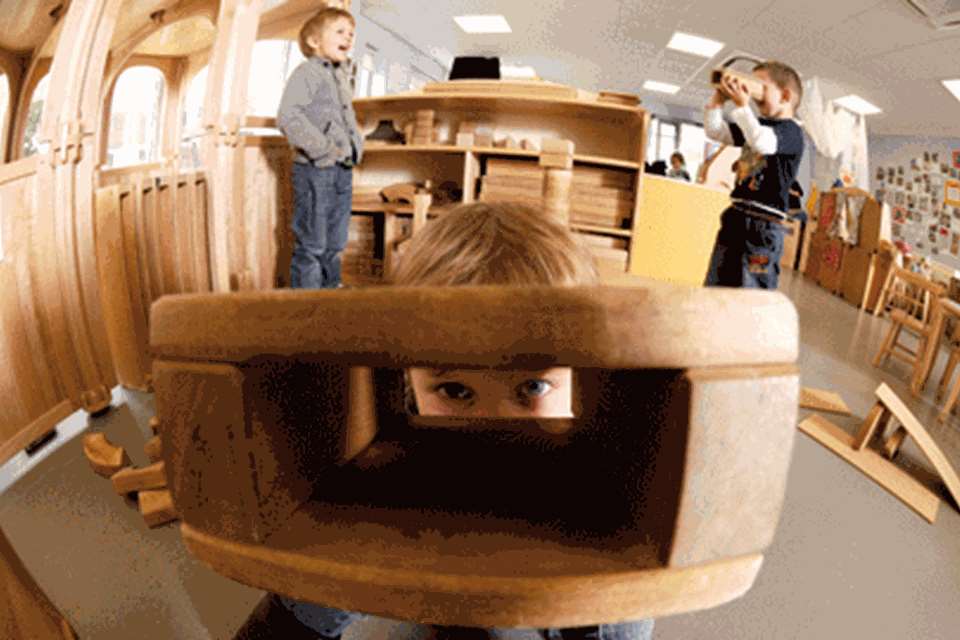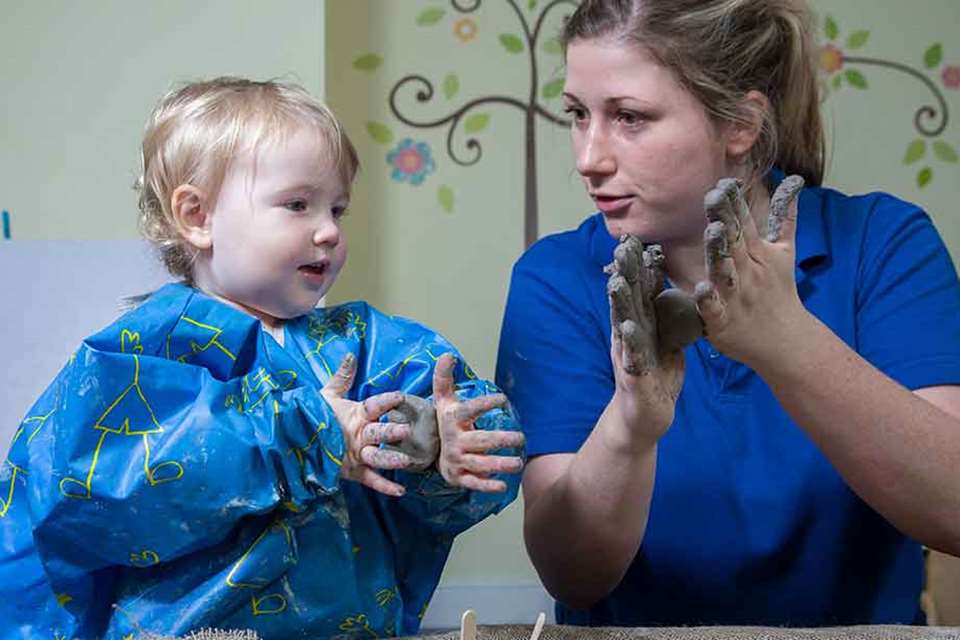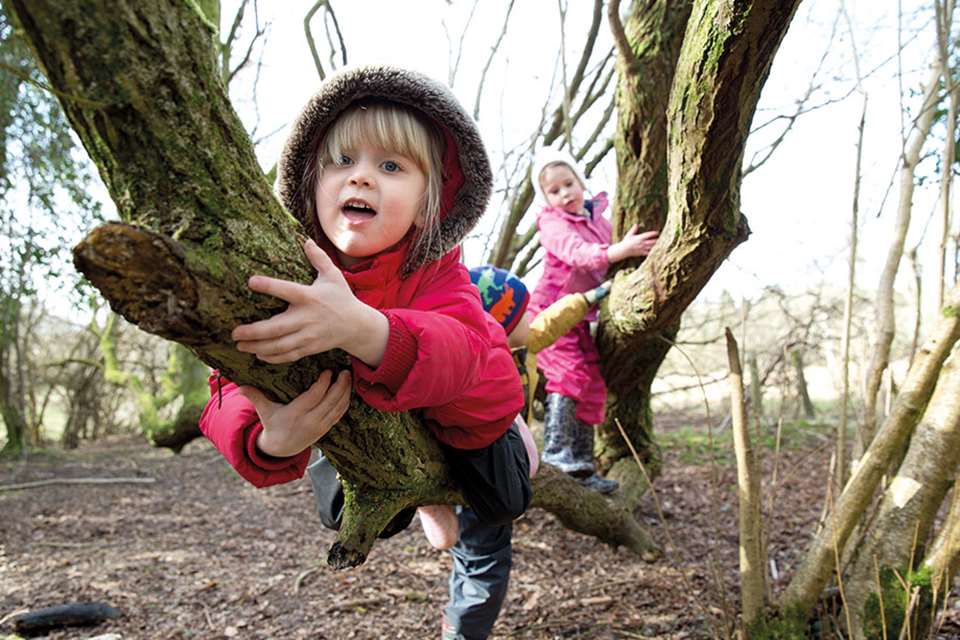EYFS Best Practice: Learning from Froebel… Nurture, family and community
Professor Tina Bruce and Jane Dyke
Monday, May 15, 2017
The importance of family and genuine links to the community and beyond. By Professor Tina Bruce and Yellow Dot’s Jane Dyke

Human beings are social beings. We need other people in order to survive, but we also need each other in order to flourish by living worthwhile lives. The pioneer educator Friedrich Froebel understood this in deep and far reaching ways.
His mother had died when he was a toddler, and his father was a strict disciplinarian. His stepmother neglected to give him love and attention once her own baby was born. He later went to live with his uncle, a gentler Lutheran pastor, where he experienced a kinder, more loving family.
It is interesting to note that key contributors to our thinking about how to nurture young children have experienced loss of family and key people themselves. Elinor Goldschmied, who pioneered the concept of the key person, was one. John Bowlby, the Nobel prize-winner who deepened our understanding of the importance of attachment, was another.
It was perhaps significant that when I trained in the 1960s as a Froebel teacher, Bowlby’s book Child Care and the Growth of Lovewas central to the course. We can see that Froebel’s approach laid the way for later understanding that children need to have at least one person who will give them love, security and be there for them. For most children this will be their parents, but this is not always possible.
A Froebelian approach means that working with the family as part of a strong team is vital. Froebelians do not tell families how to bring up their children. They help the family to work out what they want to do and to know why. But they are also clear that in a Froebelian setting, children play outside in all weather and learn through their play.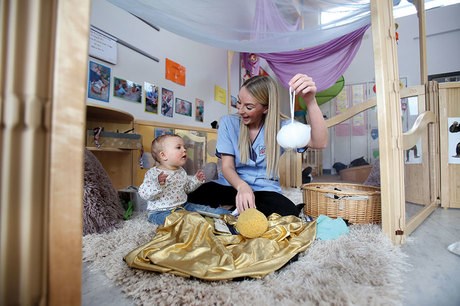
THE FROEBELIAN LEARNING EXPERIENCE
It is only fair for families to be aware of what is important to Froebelians before making the decision to send their child to such a setting or school.
Froebel stressed the importance of the learning environment involving both indoor and outdoor contexts. Engagement with nature is central to Froebelian education. This has implications for families in taking children to the park or walking by the river. How much do the children and their families actively participate in nature? Do they listen to birds, feel the bark and leaves of different trees, and jump in puddles, or understand the importance of ants and worms?
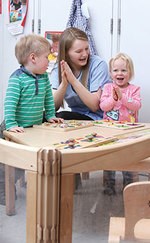 Froebel designed practical educational experiences such that children learn through the senses with freedom of movement about nature, mathematics, the sciences, humanities, arts and literature. The Gifts and Occupations, Mother Songs, Finger Plays and Movement Games and nature outings contribute to this learning (see previous articles in this series).
Froebel designed practical educational experiences such that children learn through the senses with freedom of movement about nature, mathematics, the sciences, humanities, arts and literature. The Gifts and Occupations, Mother Songs, Finger Plays and Movement Games and nature outings contribute to this learning (see previous articles in this series).
Froebel emphasised the importance of the symbolic life of the child which develops rapidly if encouraged from the time when children begin to walk, talk and pretend. This involves representation of experiences (paintings, drawings, models, pretend play) and the increasing possibility to think in more abstract ways, moving beyond the here and now to use past experience and develop future ideas.
Play is a crucial element in childhood learning. Froebel was the first educator to locate play in early childhood education settings and schools. He invented the kindergarten. He believed that in their play, children develop the tools needed to become engaged in adult work that is worthwhile. These include concentration, seeing things through to completion, pretending, creative and imaginative thinking, problem-solving and autonomy. Autonomy is about knowing when you need help and how to find it. Can you look it up in a book, copy what another child has done, ask a friend to help, find an adult to help and show you what to do? Play is an integrating mechanism that brings together and orchestrates important learning.
Froebel believed in the importance of the family in the education of the child, but he saw that parents need to be supported by the community. This is resonant with the saying that it takes a whole village to bring up a child. But Froebel established that working with other people’s children requires expertise and training.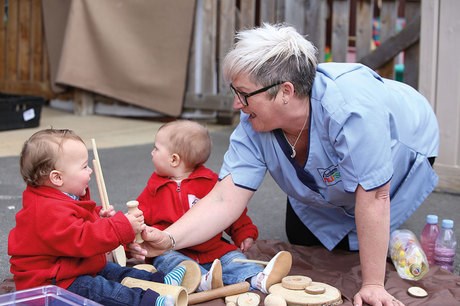
THE WORLD BEYOND
Froebel’s last writing (1944) was Mother Songs, which he designed for parents, grandparents and older siblings to sing with their young babies and children. They link children to everyday life, such as cooking meals, but also to the wider community of people who grow the ingredients.
‘Pat a cake’ is an example. Children were educated to appreciate and understand the worthwhile work of adults so that they knew about how loaves of bread came to their table. This approach of showing the complete process from start to finish in various aspects of everyday life is still used by Froebelians but in ways suited to modern life.
The family life of the child connects with that of the first community they are part of in the early childhood setting or school. There is also connection, through and with the family, to the world beyond.
Throughout this series about Froebelian education, it will become clear to readers that for Froebel there is interconnectivity. Froebel wanted us to ‘link always link’. It is perhaps significant that the organisation Save the Children was founded by the cousin of the principal of the Froebel Educational Institute.
Working directly or indirectly with and for refugee children cut off from their families matters to Froebelians. We are inextricably linked to the rest of humanity, and if we take care of each other, we will find that others take care of us – which will help to build a better world.
IN PRACTICE
How family and the community are pivotal at Yellow Dot. By Jane Dyke
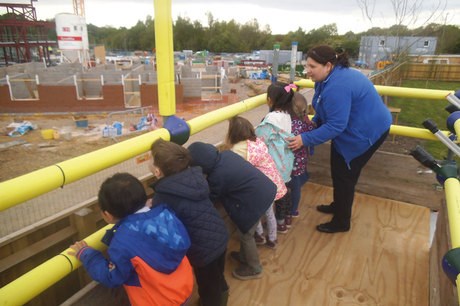
In our training, Tina [Bruce] talked about ‘professionally trained practitioners’ working as part of a team with children and families. Our parents, and Ofsted inspectors, have always been positive about our partnership with families, but the training challenged us to strengthen our relationships with our families and our community.
We always invest a great deal in training our team and believe that the more they understand about child development and early education, the greater the impact that they will have on the children in our care. We believe that everyone can contribute to the quality of our provision, so we value all views and use a range of methods, alongside our in-house training, to inspire everyone to be the best they can be. Our Froebelian journey is no different.
STRONGER TEAM
The types of training and support that we have offered the team include:
- local trips, such as visiting Annan Farm
- attending Froebel conferences in Germany and Edinburgh
- Top Tips so everyone has a handy reminder of key elements of Froebelian provision and practice, such as block play and parquetry
- additional training sessions by Tina and Froebel specialist Stella Louis, following on from their Development Day presentations
- our much-loved ‘purple book’ – Bringing the Froebel Approach to your Early Years Practice by Froebelian specialist Helen Tovey. It is an easy read and can be used as a reference book; it discusses Froebel’s key principles and ideas and gives examples of current practice. It has been a fabulous resource for us to return to continually over the past two years.
Many of us in early years have often called for the return of the NNEB and struggle with the quality of training currently available to new practitioners and apprentices. We are now supplementing this training with robust messages about Froebelian practice and underpinning all our internal training with Froebelian principles.
Since the pilot training, our support and development team, Mel Jackson and Elaine New, have delivered half-day courses and workshops on Mondays and Fridays on Froebelian principles to help our team understand the ‘why’ behind best practice. Topics have included how to marry Froebelian principles with the online assessment system, Tapestry; the Froebelian approach to observation, assessment and planning; and how to provide and support block play and a creative workshop.
We sincerely believe in the saying ‘Speed of the Leader, Speed of the Team’ and, therefore, fully embrace our responsibility in developing the potential of all team members within Yellow Dot. Every single child, and every single team member, matters.
We are a Yellow Dot family, and the key is effective communication and strong relationships. We all need a significant key person who helps us work out what we want to do and why. We believe that if we can provide this for our team, then they will be better able to provide this for our children and families. Recently, we have tweaked our review process so that it mirrors our observation, assessment and planning cycle. Our managers are the key people for their teams, and every three months we observe, assess and plan their next steps, using SMART targets.
EXPLAINING OUR ETHOS
Tina advised us to be clear about what we are providing as a Froebelian nursery. We did feel challenged by this and decided that, in future, we needed to articulate our Froebelian ethos clearly to both potential team members and parents (see box, overleaf).
We are committed to working with our children and families within a Froebelian approach, so the indoors, outdoors and third space (the community beyond our nursery gates) are all important to us.
Now when we show prospective parents and team members around the nursery, we talk purposefully about our links with the community and how we are working towards all our children having the opportunity to go to nature nursery, use real tools, explore their local community and engage with open-ended experiences, loose parts and Froebel’s Occupations within a creative workshop.
We also use some Froebelian terminology. Talking about Froebel’s Forms of Life, Knowledge and Beauty have been useful in alerting our team and parents to whether something is Froebelian or not and to considering the appropriateness of resources or the environment. (‘Life’ links to the wider community and world, ‘Beauty’ to the aesthetic, and ‘Knowledge’ to the 3D world and includes maths, science and the arts.)
We also now talk about ‘Freedom with guidance’, which relates to our balance of adult interaction and guidance while still enabling children to be in charge of themselves and each other while also respecting the environment. Froebel believed that children should be respected and taught respect for materials and each other, and with that respect should be given the freedom to choose, explore and create, and so children have control of their learning. (For more on the ‘Forms’ and ‘Freedom with guidance’, see Part 1 of this series.)
STRONGER LINKS
Froebel said ‘Link always link’ and we realise that we need to give our children the opportunity to do this by revisiting and building on their experiences. So, our aim is to give our children more meaningful experiences, to make visits more frequent, and to play a real part in our community.
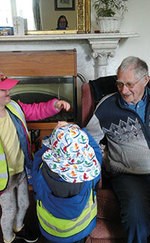
One of our kindergartens usually visit a local care home at Christmas, but this Easter visited for an egg hunt. The children remembered their last visit and were excited to see their ‘old’ friends. ‘Is the really old one going to be there?’ they asked, referring to the lady who is 102.
The field next to another of our nurseries is being developed into a dementia care home. With our new Froebelian mindset, we approached the builders to see if we could visit the site, which has an enormous crane that is visible from the nursery garden. The children were involved in digging their own sand pit, so have been very keen to watch the construction work and the deep holes that have been dug for the foundations.
We wanted to give the children opportunities to see more, so we persuaded the builders to construct a viewing platform so that we can watch the site from the safety of behind a fence. We are now part of the construction community, interconnected and linked to our community. Having shared photos of the platform with our parents on Facebook and Twitter, we are now arranging for our other nursery children to visit the site on their parents’ request.
Facebook and Twitter have been useful ways for us to build our Yellow Dot family and community and have given us a vehicle to share key messages. We have posted photos of the children looking for signs of spring in the park and encouraged families to go to the New Forest to look for foals and lambs at the weekend.
We are able to advertise parent workshops and first-aid courses, enabling us to help our families access high-quality training on sensitive subjects. Topics have included ‘Managing our emotions as parents’, ‘Understanding and managing tantrums’ and ‘Getting ready for school’.
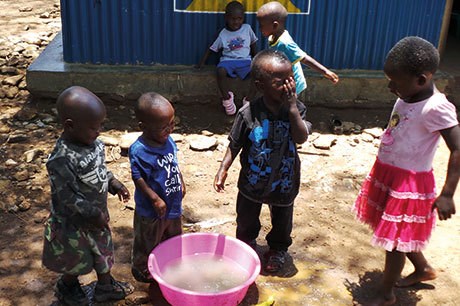 As a group, we are involved with a nursery in Kenya, which is sponsored by local coffee shop Asante. Since starting our Froebelian journey, we have been sharing Froebel’s principles and philosophies with them too.
As a group, we are involved with a nursery in Kenya, which is sponsored by local coffee shop Asante. Since starting our Froebelian journey, we have been sharing Froebel’s principles and philosophies with them too.
This year, we raised money for a water tap stand near the toilets, which we funded last year. When we talked to the parents about the fundraising events and upcoming ‘Africa Week’, many remarked, ‘Great! This is my favourite week at nursery’; ‘Dan loved that last year. Will you decorate the nursery again?’; ‘Is the African drummer coming again? He was amazing, such a brilliant experience. Beth’s granny will want to see him.’
This year we raised £4,432, which two of our team took to Kenya. They spent three weeks working with the teachers in Kisumu, sharing Froebelian practice.
As Tina points out at the start of this article, ‘Human beings are social beings. We need other people in order to survive, but we also need each other in order to flourish by living worthwhile lives.’ Our Froebel journey is enabling us to ‘flourish’, to dig deeper, and to build closer connections between nursery, home and our world.
ON MESSAGE
Our website has been an important means through which to articulate our Froebelian ethos. At www.yellowdotnursery.co.uk/Friedrich_Froebel.cfm, we explain who Froebel was, his philosophy and approach to early education, our participation in the Froebel training pilot and its impact on our practice and thinking. Here is part of it:
‘Tina [Bruce] is a passionate Froebelian educator with a lifelong interest in the benefits of learning through play. The training Yellow Dot has received from Tina and her team has influenced our thinking and practices and has helped us develop our use of natural resources and open-ended play within our indoor and outdoor environments.
‘Froebel believed that play is the highest level of child development and felt that it is essential to give children the freedom to choose, take control, explore, create, imagine and go beyond thinking about the “here and now”. At Yellow Dot we are developing children’s learning through play in ways that are meaningful to each individual child, following their interests, enabling them to be self-motivated whilst being supported by their key people within Yellow Dot.
‘We follow the Froebelian belief that children need rich first-hand experiences which we facilitate as adults which then provoke an interest in the children who then have the freedom to explore their ideas as well as receiving adult support and guidance (Froebel called this “Freedom with guidance”). We believe the best play happens when children and adults play together respecting each other’s ideas and learning from each other.
‘If Froebel’s approach to early years education has inspired you and you would like to know more, please email me on hello@yellowdotnursery.co.uk.’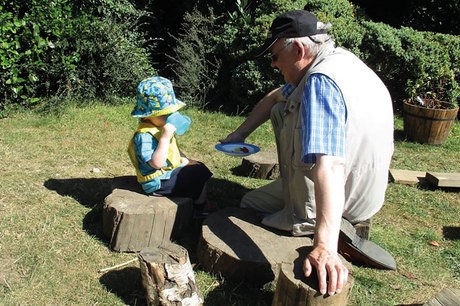
ABOUT THIS SERIES
This six-part series aims to:
- convey Froebel’s continuing importance as an early years educator and thinker
- make links between the EYFS and Froebel’s principles and approach to early development and learning
- demonstrate ‘Froebel in action’ at Yellow Dot Nurseries, Hampshire, which piloted training courses designed to help PVI settings embrace the Froebelian approach.
Co-written by Froebelian expert Professor Tina Bruce and Yellow Dot founder and owner Jane Dyke, the six articles cover:
- the Gifts
- the Occupations
- the place of nature in learning
- the symbolic life of the child
- the importance of nurture
- self-discipline rather than extrinsic motivation.
Linked to the series is a set of posters produced in association with Community Playthings (www.communityplaythings.co.uk), which will be taking part in this year’s bicentenary celebrations of the founding of Froebel’s school in Keilhau, Germany.
MORE INFORMATION
For more on the life and work and Elinor Goldschmied and John Bowlby, visit: www.nurseryworld.co.uk/early-years-pioneers
Practitioners’ visit to Keilhau, www.nurseryworld.co.uk/nursery-world/opinion/1157208/experiencing-froebels-legacy
Bruce T (ed) (2012) Early Childhood Practice: Froebel Today. Sage
Bruce T (2015) Early Childhood Education.5th edn. Hodder Education
Liebschner J (1992) A Child’s Work: Freedom and Guidance in Froebel’s Educational Theory and Practice. Lutterworth Press
Froebel F (1887) The Education of Man. Appleton
Tovey H (2016) Bringing the Froebel Approach to Your Practice. 2nd edn. Routledge.


